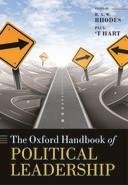 The Oxford Handbook of Political Leadership
The Oxford Handbook of Political Leadership
Contents
-
-
-
-
-
-
-
-
-
-
-
-
-
-
-
-
-
-
-
1 Introduction 1 Introduction
-
2 Scholarship on Women as Political Leaders 2 Scholarship on Women as Political Leaders
-
3 The Selection and Election of Female Leaders 3 The Selection and Election of Female Leaders
-
4 Legislative and Party Leadership 4 Legislative and Party Leadership
-
5 Executive Leadership 5 Executive Leadership
-
6 Below and Beyond the National Level 6 Below and Beyond the National Level
-
7 Understanding How Gender Matters: Suggestions for Future Research 7 Understanding How Gender Matters: Suggestions for Future Research
-
8 Conclusion 8 Conclusion
-
Recommended Reading Recommended Reading
-
References References
-
-
-
-
-
45 Does Gender Matter?
Get accessPatricia Lee Sykes is Associate Professor of Government in the School of Public Affairs at American University in Washington DC. She is the author of two books: Presidents and Prime Ministers: Conviction Politics in the Anglo-American Tradition and Losing from the Inside: The Cost of Conflict in the British Social Democratic Party and numerous articles in scholarly journals such as Studies in American Political Development and Presidential Studies Quarterly. She is currently writing a book on female executives in six Anglo-American systems.
-
Published:16 December 2013
Cite
Abstract
Gender as a concept or conceptual lens is a relatively recent development that has seldom been used to examine political leaders, but it provides an analytic tool that can give fresh insights on the leadership of both men and women and facilitate theory-building in the field, of leadership studies. This chapter looks through a gender lens at the empirical data on and evolving knowledge of, female leaders in four categories: selection and election, legislative and party leadership, executive leadership, and, as this handbook classifies it, leadership ‘below and beyond the national level’. Then, in the final section, this chapter considers how the concept of gender might be used to enhance our understanding of leadership and its context in general. Exploring how gender matters can provide a different perspective on leaders and suggest an alternative approach to questioning political leadership.
Sign in
Personal account
- Sign in with email/username & password
- Get email alerts
- Save searches
- Purchase content
- Activate your purchase/trial code
- Add your ORCID iD
Purchase
Our books are available by subscription or purchase to libraries and institutions.
Purchasing information| Month: | Total Views: |
|---|---|
| October 2022 | 10 |
| November 2022 | 17 |
| December 2022 | 4 |
| January 2023 | 12 |
| February 2023 | 7 |
| March 2023 | 12 |
| April 2023 | 6 |
| May 2023 | 9 |
| June 2023 | 11 |
| July 2023 | 7 |
| August 2023 | 2 |
| September 2023 | 3 |
| October 2023 | 5 |
| November 2023 | 15 |
| December 2023 | 7 |
| January 2024 | 4 |
| February 2024 | 5 |
| March 2024 | 5 |
| April 2024 | 4 |
| May 2024 | 3 |
| June 2024 | 11 |
| July 2024 | 9 |
| September 2024 | 3 |
| October 2024 | 3 |
| November 2024 | 6 |
| December 2024 | 2 |
| February 2025 | 1 |
| March 2025 | 12 |
| April 2025 | 5 |

Get help with access
Institutional access
Access to content on Oxford Academic is often provided through institutional subscriptions and purchases. If you are a member of an institution with an active account, you may be able to access content in one of the following ways:
IP based access
Typically, access is provided across an institutional network to a range of IP addresses. This authentication occurs automatically, and it is not possible to sign out of an IP authenticated account.
Sign in through your institution
Choose this option to get remote access when outside your institution. Shibboleth/Open Athens technology is used to provide single sign-on between your institution’s website and Oxford Academic.
If your institution is not listed or you cannot sign in to your institution’s website, please contact your librarian or administrator.
Sign in with a library card
Enter your library card number to sign in. If you cannot sign in, please contact your librarian.
Society Members
Society member access to a journal is achieved in one of the following ways:
Sign in through society site
Many societies offer single sign-on between the society website and Oxford Academic. If you see ‘Sign in through society site’ in the sign in pane within a journal:
If you do not have a society account or have forgotten your username or password, please contact your society.
Sign in using a personal account
Some societies use Oxford Academic personal accounts to provide access to their members. See below.
Personal account
A personal account can be used to get email alerts, save searches, purchase content, and activate subscriptions.
Some societies use Oxford Academic personal accounts to provide access to their members.
Viewing your signed in accounts
Click the account icon in the top right to:
Signed in but can't access content
Oxford Academic is home to a wide variety of products. The institutional subscription may not cover the content that you are trying to access. If you believe you should have access to that content, please contact your librarian.
Institutional account management
For librarians and administrators, your personal account also provides access to institutional account management. Here you will find options to view and activate subscriptions, manage institutional settings and access options, access usage statistics, and more.